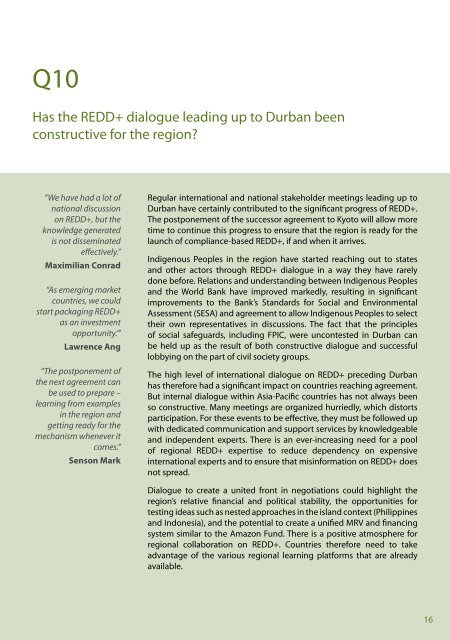Forests and climate change after Durban - RECOFTC
Forests and climate change after Durban - RECOFTC
Forests and climate change after Durban - RECOFTC
Create successful ePaper yourself
Turn your PDF publications into a flip-book with our unique Google optimized e-Paper software.
Q10Has the REDD+ dialogue leading up to <strong>Durban</strong> beenconstructive for the region?“We have had a lot ofnational discussionon REDD+, but theknowledge generatedis not disseminatedeffectively.”Maximilian Conrad“As emerging marketcountries, we couldstart packaging REDD+as an investmentopportunity.’”Lawrence Ang“The postponement ofthe next agreement canbe used to prepare –learning from examplesin the region <strong>and</strong>getting ready for themechanism whenever itcomes.”Senson MarkRegular international <strong>and</strong> national stakeholder meetings leading up to<strong>Durban</strong> have certainly contributed to the significant progress of REDD+.The postponement of the successor agreement to Kyoto will allow moretime to continue this progress to ensure that the region is ready for thelaunch of compliance-based REDD+, if <strong>and</strong> when it arrives.Indigenous Peoples in the region have started reaching out to states<strong>and</strong> other actors through REDD+ dialogue in a way they have rarelydone before. Relations <strong>and</strong> underst<strong>and</strong>ing between Indigenous Peoples<strong>and</strong> the World Bank have improved markedly, resulting in significantimprovements to the Bank’s St<strong>and</strong>ards for Social <strong>and</strong> EnvironmentalAssessment (SESA) <strong>and</strong> agreement to allow Indigenous Peoples to selecttheir own representatives in discussions. The fact that the principlesof social safeguards, including FPIC, were uncontested in <strong>Durban</strong> canbe held up as the result of both constructive dialogue <strong>and</strong> successfullobbying on the part of civil society groups.The high level of international dialogue on REDD+ preceding <strong>Durban</strong>has therefore had a significant impact on countries reaching agreement.But internal dialogue within Asia-Pacific countries has not always beenso constructive. Many meetings are organized hurriedly, which distortsparticipation. For these events to be effective, they must be followed upwith dedicated communication <strong>and</strong> support services by knowledgeable<strong>and</strong> independent experts. There is an ever-increasing need for a poolof regional REDD+ expertise to reduce dependency on expensiveinternational experts <strong>and</strong> to ensure that misinformation on REDD+ doesnot spread.Dialogue to create a united front in negotiations could highlight theregion’s relative financial <strong>and</strong> political stability, the opportunities fortesting ideas such as nested approaches in the isl<strong>and</strong> context (Philippines<strong>and</strong> Indonesia), <strong>and</strong> the potential to create a unified MRV <strong>and</strong> financingsystem similar to the Amazon Fund. There is a positive atmosphere forregional collaboration on REDD+. Countries therefore need to takeadvantage of the various regional learning platforms that are alreadyavailable.16
















